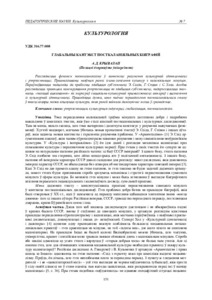Please use this identifier to cite or link to this item:
https://elib.psu.by/handle/123456789/22447Full metadata record
| DC Field | Value | Language |
|---|---|---|
| dc.contributor.author | Крывалап, А. Д. | - |
| dc.date.accessioned | 2018-09-26T06:28:21Z | - |
| dc.date.available | 2018-09-26T06:28:21Z | - |
| dc.date.issued | 2018 | - |
| dc.identifier.citation | Вестник Полоцкого государственного университета. Серия E, Педагогические науки. - 2018. - № 7. - С. 151-155. | ru_RU |
| dc.identifier.uri | https://elib.psu.by/handle/123456789/22447 | - |
| dc.description | The Global Context of the Postcolonial Biographies А. Krivolap | ru_RU |
| dc.description.abstract | Разглядаецца феномен посткаланіялізму ў кантэксце разумення культурнай ідэнтычнасці і рэпрэзентацыі. Прааналізаваны наяўныя рамкі (сама-)апісання культур з каланіяльным мінулым. Параўноўваюцца падыходы да праблемы здабыцця суб'ектнасці Э. Саіда, Г. Співак і С. Хола. Асобна разглядаецца практыка канструявання рэпрэзентацыі як здабыцця суб'ектнасці, падкрэсліваецца значнасць «пазіцый выказвання» як маркераў сацыяльна-культурнай прыналежнасці актараў і вызначэння іх культурнай ідэнтычнасці. Праводзіцца думка, што падчас пераадолення посткаланіяльнага стану ў якасці ахвяры можа апынуцца культура, якая раней займала дамінуючае месца ў грамадстве.= The article discusses the consideration of the phenomenon of postcolonialism in the context of understanding cultural identity and representation. The article analyzes the existing framework for representation and self-representation of cultures with a colonial past. Approaches to the problem of finding subjectivity in the texts of E. Said, G. Spivak, and S. Hall are compared. Separately, the practice of constructing representation as the acquisition of subjectivity, as well as the importance of "the positions of enunciation", as markers of the socio-cultural affiliation of actors and the definition of their cultural identity, is considered separately. The observations and conclusions made in the article allow the author to formulate the idea that in the situation of overcoming the postcolonial state, a culture that previously occupied a dominant position in society may turn out to be a victim. | ru_RU |
| dc.language.iso | be | ru_RU |
| dc.publisher | Полоцкий государственный университет | ru_RU |
| dc.relation.ispartof | Веснік Полацкага дзяржаўнага ўніверсітэта. Серыя E, Педагагічныя навукі | be_BE |
| dc.relation.ispartof | Herald of Polotsk State University. Series E, Pedagogical Sciences | en_EN |
| dc.relation.ispartof | Вестник Полоцкого государственного университета. Серия E, Педагогические науки | ru_RU |
| dc.relation.ispartofseries | Серия E, Педагогические науки;2018. - № 7 | - |
| dc.rights | open access | ru_RU |
| dc.subject | Педагогика | ru_RU |
| dc.subject | Государственный рубрикатор НТИ - ВИНИТИ::ОБЩЕСТВЕННЫЕ НАУКИ::Народное образование. Педагогика | ru_RU |
| dc.subject | Государственный рубрикатор НТИ - ВИНИТИ::ОБЩЕСТВЕННЫЕ НАУКИ::Культура. Культурология | ru_RU |
| dc.subject | Рэпрэзентацыя | ru_RU |
| dc.subject | Культурныя індустрыі | ru_RU |
| dc.subject | Глабалізацыя | ru_RU |
| dc.subject | Посткаланіялізм | ru_RU |
| dc.subject | Postcolonialism | ru_RU |
| dc.subject | Cultural industries | ru_RU |
| dc.subject | Representation | ru_RU |
| dc.subject | Globalization | ru_RU |
| dc.subject | Biorgaphy | ru_RU |
| dc.title | Глабальны кантэкст посткаланіяльных біяграфій | ru_RU |
| dc.type | Article | ru_RU |
| dc.identifier.udc | 316.77:008 | - |
| Appears in Collections: | 2018, № 7 | |
Files in This Item:
| File | Description | Size | Format | |
|---|---|---|---|---|
| 151-155.pdf | 196.21 kB | Adobe PDF |  View/Open |
Items in DSpace are protected by copyright, with all rights reserved, unless otherwise indicated.